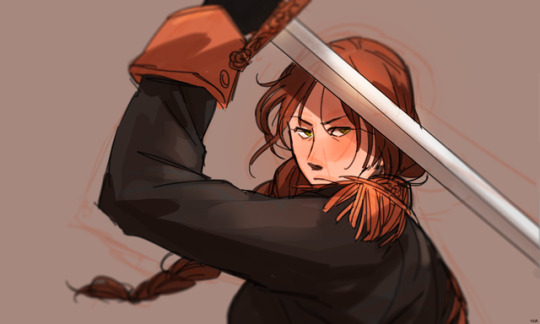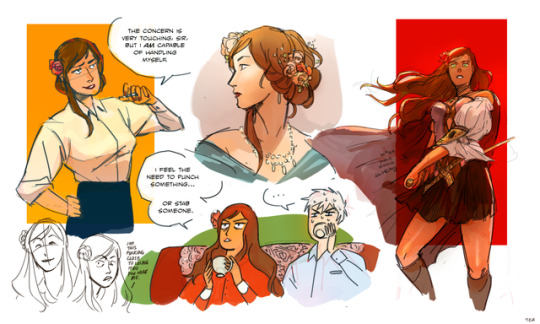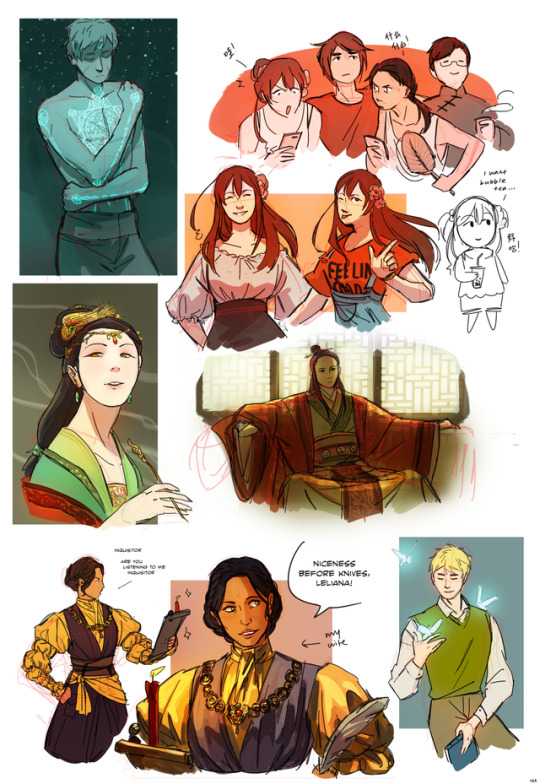Photo



A MASSIVE STRESS DUMP OF … my queens and wives … and a some other people from the past few days this is a mess
3K notes
·
View notes
Text
prussia’s middle name is maria no backsies no fuckin backsies his name is gilbert maria beilschmidt
4K notes
·
View notes
Note
So, because I see how thought-out your answers are, I was going to ask you why you like Nico so much, because I honestly don't see where the likeable-ness of his character is, besides the angst. I'm really not trying to offend you or anything but... Just wanted to know :)
You’re in luck because there are two characters in the world that I am endlessly patient about waxing poetic about (so basically don’t expect me to put this much effort into defending anyone else). The first is Keladry of Mindelan, and the second is Nico di Angelo.
I think the number one thing I love about Nico’s character is how contrary it is to what you’d EXPECT a son of Hades to be? Like, we are first introduced to him as this dorky, overly excitable kid with no brain-to-mouth filter. He’s really, really not the dark and broody prince I so often see him visualized as? I mean, he’s a huge mythomagic geek who loves the game so much he recites the stats of cards back at you (my heart).
Anyways, moving on. He has this reputation as a character who is standoffish with questionable loyalties (thanks, Percy), which makes it easy to conclude that he cares only about himself and angsts all the time (he doesn’t), but the thing you have to understand is Nico is entirely motivated by love. Remember the scene in HoH where Frank says that bit about “we’ll do anything for someone we love,” and Nico answers bitterly, “I guess we will”? That wasn’t just about Percy. His entire journey from the Titan’s Curse through Son of Neptune is based on his love for his sister Bianca and his desire to bring her back. When he tricks Percy into seeing Hades in TLO, it’s because he wants information about his mother. This shows another important aspect of his character - he lacks guile. Nico’s really sort of naturally trusting and naive and when he makes a deal with his father, he never figures Hades could renege on the deal or have ulterior intentions. Naturally, when this is what ends up happening, Nico immediately feels remorseful and from that point on becomes completely focused on redeeming himself to Percy. He cares so much about Percy’s opinion of him and it’s obvious way before the HOO series even began. Ultimately Nico wants to do the right thing, hence why he convinces his father to join the rest of the gods in fighting the Titans.
I also really like that regardless of situation, Nico is basically compassionate. There are so many instances throughout both series where Nico shows kindness beyond what is necessary, and not for personal gain? To list it sort of succinctly - Nico is the only one to notice and talk to Hestia when all the other campers wouldn’t bother. He talks to and befriends Iapetus/Bob and tells him good things about Percy. He is seen talking to and reassuring Gwen (Roman legionary who dies and comes back to life in the beginning of SoN) when he doesn’t even know her that well. Nico isn’t really all that socially awkward or shy about approaching people (he’s guarded, sure, and thanks to Tartarus his insecurities about being hated and isolated are all brought to the surface, but Nico isn’t stingy about helping other people or giving them his attention). He notices the unnoticed and the forgotten, and I think it’s because he knows what that isolation feels like, and he can empathize. He’s also kind and affectionate towards Hazel, to the point that she becomes incredibly loyal and affectionate to him in kind (and she doesn’t seem the type to form attachments so easily). I really don’t think she feels that way towards him simply because she’s grateful to him for bringing her back to life - he tries to treat her as he would a real sibling and so she returns the favor.
Finally, I think Nico is ultimately a good kid. I’m predisposed to like antihero types, which is often what Nico is framed as (being a son of Hades, being someone not part of the main crew), but right from the start there was no real doubt that when it came down to it, he’d put doing the right thing first. His searching for the Doors of Death was all to help with the Prophecy of Seven quest. Remember when he said he would disappear after the prophecy was over? If he honestly only cared for his own interests, he’d have disappeared long before then. He’d have no reason to volunteer to transport the Athena Parthenos. He might be “angsty” but he never lets it get in the way of the quest. This kid is someone who looked up to Percy when he was 10, and saw him as a “real hero,” and that admiration is really telling of his character - heroism is something that appeals to Nico, and I think he’s growing up to be quite a hero himself.
#fave#pjo#. .. i love nico very much and my favorite thing about him is how kind he is to others who are unseen...#i have much love for him#writing
4K notes
·
View notes
Text


Counter to the large misconception that Hetalia is racist, Himaruya’s work goes through great lengths to evoke a sense of familiarity in readers. Many of us are immigrants or have parents/ grandparents who were immigrants. It’s a common fact of life, but what I’ve always admired about Hetalia is that there isn’t an asymmetric power imbalance between the personification and their citizens. By that, I mean that the personifications experience many of what we all go through. Our experiences are reflected in their own, allowing for a greater sense of relatability and stronger affective responses.
That said, let’s go over some examples.
America:
Growing up, America grew accustomed to being left alone for long periods of time. When it came to the settlement of the Wild West, he could no longer be a “crybaby.” It’s stated that this experience hardened him.
Source: Hetarchive (Bamboo Thicket, eng trans., Oct 9th, 2010) + Hetarchive, Notes & Etc.

Ex: He didn’t have many possessions.

Source: Hetarchive, Miscellaneous Extra Book.
Ex: He would travel on foot for days in order to reach the polling stations.
Source: Hetascanlations, World Stars 156.

The most insight we are given on the impact that this part of his life had on his personality is when England questions if America mass produces to compensate for the poverty he experienced as a young child/ adult.
Source: Hetarchive, Christmas Event 2011.

Lithuania:
Lithuania’s immigrant experience stemmed from poverty as well. Post–WW1, a large percentage of his population left the country to seek work in America. Lithuania was no exception to this and went to live with America. There, he did America’s clerical work and basically acted as his personal assistant.
Source: Hetarchive, Lithuania’s Out-Sourcing pt. 1.



The strips depicting Lithuania’s out-sourcing will always have a place in my heart, as he and America develop a close friendship. Both were lonely after losing close friends and partners (i.e., England and Poland). It was overall a good healing experience for them, but especially for Lithuania, who had previously lived with Russia.


Of most importance is that this arc illustrates how America was and still continues to be built on the backs of hard-working immigrants who want nothing but a better life for themselves.
Romano:
Romano’s immigrant experience is probably the most profound concerning character development.
First, some contextualization is needed. Romano had previously been living with Spain. Just when it’s said that he grew comfortable living there, he was abruptly reunified with his brother and they were forced to live together after centuries of minimal contact. It is because of this historical rift that this same fragmentation is reflected in their personal relations.
Source: Hetascanlations, World Stars Chapter 20.

Rather than relying on Veneziano to support him, Romano decides to seek employment overseas in America during the Second Industrial Revolution.
Source: Hetascanlations, World Stars 58.


It’s a scary and foreign place to him. He’s on his own and must navigate things for himself. Not only that, but America immediately puts him to work in a janitorial position. Keep in mind that Romano was notorious for not keeping up with chores at Spain’s house.
Source: ibid.

To ease and process his anxiety, Romano relies on the one person who has ever really felt like home: Spain. Romano’s determination to work sparks surprise in Spain. Again, Romano was not exactly known for having a good work ethic.
Source: Hetascanlations, World Stars 73.


This experience of being an immigrant instilled a work ethic in Romano. He learned to become a hard and diligent worker, albeit only when he wants to. Still, it’s an improvement! Eventually, he finds a better job tailored specifically for him and becomes America’s cook.
Source: Hetascanlations, World Stars Chapter 59 & 121.


Of most importance is that Romano’s time in America is still translated and seen in his present-day personality. Being an immigrant profoundly impacted him in the sense that he learned not only what hard work is but also the rewards of it. I would also argue that the latent themes of this arc mark Romano’s progression into adulthood, as he and his brother had just received their independence.
Source: Hetarchive, Christmas Event 2011.

All in all, the source material shows how Hetalia is anything but xenophobic and racist. Anyone who has read the comics would know that.

718 notes
·
View notes
Text


What this post aims to do is cover Japan’s relationship with other Asian nations. While a tricky subject for good historical reasons, I think that while he initially had a rough start, Himaruya does a fair job of balancing a narrative that promotes worldwide peace and reconciliation without trivializing or obscuring the tragedies of the past.
Keep reading
208 notes
·
View notes
Text


What this post aims to do is chart out Italy and Romano’s rather…rocky relationship. It’s not something that has warranted a lot of discussion in the community, so I thought it would be an interesting topic to touch on.
Early Childhood + Ingrained Inferiority:
It’s well-known that Rome devoted more time raising Veneziano than he did with Romano. As such, Romano has a long and well-developed hostility towards Veneziano, all of which stems from his own feelings of inferiority and insecurities.
Sources: Hetarchive, Chibitalia & Volume 6.


What really cemented this inferiority complex is that after Romano is conquered by Spain, Spain constantly compares Romano to Veneziano and even asks Austria to trade brothers with him. Romano feels even poorly about himself as a result.
Keep reading
337 notes
·
View notes
Text


Iceland, huh? For such a minor character, he’s perhaps one of my favourites, mainly because his personality is so interesting and, well, relatable.
Let’s get some clarifications out of the way first: Norway is Iceland’s older brother. They’re related.
After having an excavation done on his land, Iceland finds out that he has no strictly Icelandic indigenous people. Instead, it was Norwegians who had first settled there before travelling elsewhere.



Now, this is important in establishing a tentative ground principle in understanding the family trees in the series. I’ve found a pair of relatively consistent rules too: It seems that nations are biologically related when…
1) There is one dominant nationality of sibling #1’s people living on the other sibling’s land – Ex: in this case, it would be early Norwegians initially settling on Iceland.
And/ Or
2) The nations of the siblings are typically next to one another – Ex: America and Canada, Netherlands and Belgium, Germany and Prussia, & Russia, Belarus, and Ukraine.
I know it’s messy, but remember that these rules are exceptive and only apply when Hima explicitly makes them siblings. You can have nations, like Spain and Portugal, who look alike due to similar ancestral influences on their histories and cultures, and yet, they’re only listed as neighbors with no biological relation.
It’s important that I make this distinction only because the Nordics all refer to each other as brothers in an affectionate way, despite us knowing that they’re not actually related. Again, the only ones who are confirmed to be related are Norway and Iceland.
There’s also the presence of brother figures in the series. Regarding Iceland, he sees the other Nordics as older brothers.

What’s sad is that he didn’t get to meet most of the Nordics until the 18th century.

While Denmark may have raised him…

…right from birth Iceland sensed that Norway was his older brother.


Now for Iceland’s personality.
Predicating from his childhood and geographic isolation, Iceland is unsociable. The irony is that he also feels lonely.

No one really knows anything about him, and he’s often the odd man out.


Despite this alleged unsociability, Iceland still worries about making friends.

Arguably, Iceland is closest with Norway, who likes to “stick” into the former’s business.

While Iceland may snap at Norway and the other Nordics, he secretly appreciates their concern – especially Norway’s. He doesn’t hate any of them.


In fact, this somewhat erratic moodiness is actually part of Iceland’s personality.
His contrasting warm (volcanoes, hot springs) and freezing climate gives way to a polarizing temperament. As such, he’s noted to have a hot and cool side.

This unpredictability in mood, metaphorically understood in terms of how you never know when a volcano will explode, is seen in Iceland right from birth.

His cool side relates more to his unsociability and shyness.
What’s more, his hot side doesn’t always have to do with his temper or irritability. It can also mean the playfulness and mischievousness of a young child.

Another fun fact is that Iceland is able to see Norway’s magical creatures, albeit refusing to acknowledge this ability.


All in all, akin to his climate and geography, Iceland isn’t static and is therefore far from your typical stock character. He has a profoundly rich and complex personality stemming from a childhood filled with neglect, isolation, and loneliness; the problem for him now is whether he’ll be able to reconcile all this and open himself up to others more.

1K notes
·
View notes
Text


Misconception: Finland has a sweet, child-like appearance, so he must be weak.
Reality: Finland’s a warrior, and is noted to possess immense strength and resilience.
Ex: He’s so cold-resistant that General Winter has no effect on him. They even get along.


Ex: He’s visibly disappointed when Sweden calls off a battle during one of the Polish-Swedish wars. Not to mention that he was excited about engaging in the fight.


Ex: His patience isn’t endless. It’s said that if you poke him ten times, he’ll forgive you, but once you pester him enough, he’ll get you back ten times harder.
[There’s a slight difference in the translation, but it’s basically the same thing.]

Misconception: Like Iceland, Finland’s one of the tamer Nordics.
Reality: Finland’s actually quite strange.

Ex: He loves nature and enjoys being covered in grass.


Misconception: He’s Sweden’s wife = Sufin is canon.
Reality: He is not Sweden’s wife. Sufin is not canon.
Sweden calls Finland his wife, but Finland does not accept the label.


The two do share a close relationship though, enough for Finland to refer to Sweden as “Swe.”
Although, Finland is often just as perplexed by Sweden as the other nations are.

Misconception: He’s a jittery, nervous, and shy person as a result of being overshadowed by the other Nordics.
Reality: He’s soft-spoken, and quiet-voiced, but is far from quiet. In fact, he can be a very talkative and bubbly character at times. Nonetheless, he is said to be overshadowed by the other Nordics.
Ex: Finland jokes with Germany about his boss, despite the fact that the humour goes right over Germany’s head.

Ex: Finland’s noted to be a particularly nagging person.

Bonus Facts:
He lightly teases Iceland and once asked the latter to call him Big Brother.

He’s offered to act as a father figure to America.

He loves saunas, sweets, and alcohol. Bonus if it’s all combined together.

He’s had the hardest time out of all the Nordics, likely stemming from the fact that he’s historically been an underling to other nations.


1K notes
·
View notes
Photo





Hetalia World ☆ Stars - Chapter 281 Original Translation: y4nderenka // donamoeba Scanlation: tsuckishima // jammerlea Please link back to our Tumblr when using translated images on other sites.
2K notes
·
View notes
Text
[blog update] Private Concert
Original












T/N: In Prussia’s flashback, the bed-ridden child is Holy Roman Empire. His speech pattern in Japanese is different from Germany’s.
12K notes
·
View notes
Text


While characterizations depicting Romano as an easily irritated and rude person isn’t in whole inaccurate, it’s nonetheless one-sided and uncontextualized. By that I mean that this type of characterization erases the fact that Romano’s incredibly sensitive from a lifetime full of pestering insecurities and fears. He’s bottled up a lot of these emotions and lashes out as a result. Likewise, it also erases Romano’s loyalty in spite of his poor way of expressing it.
Let’s unpack what I mean by this.
For one thing, it’s canon that Romano is an even bigger crybaby than Veneziano.
Source: Volume 2.


A lot of this stems from feelings of resentment and inadequacy that he developed as a child. Rome spent the majority of his time rearing and caring for Veneziano.
Source: Hetarchive, Chibitalia.

Consequently, Romano develops an inferiority complex and feels inadequate compared to Veneziano.
Source: Boss Spain’s Control of Southern Italy pt 2.

What doesn’t help is that Romano placed second again when invading countries preferred Veneziano over him.
For example, Spain initially wanted to trade Romano for Veneziano, as Romano’s manners and housekeeping skills weren’t nearly up to par.
Source: Hetarchive, Boss Spain’s Control of Southern Italy pt 1.


It sounds horrible, but we do get a touching scene where Spain eventually reconciles with Romano, learning to accept and love him for who he is.
Source: Boss Spain Doesn’t Understand.
The two meet each other halfway and develop a strong bond in which they genuinely enjoy living together.


That bond is abruptly cut during Italian Unification, where Veneziano and Romano are forced together after centuries of separation in which they rarely saw each other.


Sources: Hetascanlations, World Stars Chapter 20 & 73.
Since Romano still had unresolved feelings towards Veneziano, the two didn’t exactly get along. As such, Romano opts to move to America instead to look for work. The immigrant life was a scary and unfamiliar terrain for Romano to traverse. To cope with this, he calls the first person who’s ever felt familiar and homely to him: Spain.
Source: Hetascanlations, World Stars Chapter 73.

Point is, even though Romano doesn’t show it, he’s very sensitive and shows it in ways that aren’t the most obvious.
While I initially rubbed this off as trivial, there are scenes during WW2 that are particularly important in showcasing Romano’s vulnerability.
Ex: He cries during the infamous failed mustache incident with Germany.
Source: Volume 1.

Ex: He cries and hides behind Germany from France – note that this is likely indicative of the fact that Romano is reliving the childhood fear of being conquered and attacked.
Source: Volume 1.

Other examples of vulnerability would include him being sensitive about his height and crying into tears of joy when Grandpa Rome visits him from heaven.
Lastly, it’s also important to recognize that while Romano may be rude, even to people he cares about, he’s loyal.
Ex: During the immigrant period of his life, he cheered on America when the latter surpassed England in industrial production.
Source: Hetascanlations, World Stars Chapter 70.

Ex: While too shy to do this upfront, Romano looks out for Veneziano in WW2 by remaining skeptical towards Germany, questioning him about his intentions.
Source: Volume 1.

Ex: Romano tries to save Spain from illness during an economic recession, which forces him to come into conflict with the mafia, who he’s normally terrified of.
Source: Hetarchive, In just two minutes you can grasp the exterior of the European economy.


All in all, it would be unfair to say that Romano’s a prick without contextualizing this within a broader understanding of him employing a tough exterior to hide a more sensitive than normal interior.

612 notes
·
View notes
Text


The purpose of this post is to delineate the fact that nations that have cultural influences on each other are not biologically related. While the influencee may adopt traits from the influencer in some cases, it doesn’t always constitute a biological relation. What’s even more confusing is that there are specific adopted traits that the nations use to mark a biological relation.
I know this sounds obscure, but it’ll make sense when I go through some examples.
Romania and Bulgaria vs Romano and Veneziano:
A gag with Romania in the series is that he claims that he’s a descendant of Rome, and, therefore, an Italy brother.
However, even though Rome did, in fact, instill significant cultural influence in Romania, Romano is quick to reject this claim. He identifies the presence of a curl as proof of biological lineage from Rome. Remember that Rome is said to have had many grandchildren and adopted grandchildren.
Source: Hetascanlations, World Stars Chapter 163 + Hetarchive (Bamboo Thicket, eng trans., October 30th, 2014).


Later, we see the same rejection occur with Bulgaria, who has Roman ruins.
Source: Hetarchive (Bamboo Thicket, eng trans., Oct 22nd, 2014).


England, America, Finland, and France: (+ more)
As I’ve stated before, England and America are not biologically related. England is stated to be the fourth and youngest sibling in his family, consisting of Wales, Northern Ireland, and Scotland.
Source: Hetarchive (Bamboo Thicket, eng trans., Aug 4th 2010).
In the Battle for America, it’s explicitly stated that England becomes America’s brother. We also learn that because America was a “melting pot” of several cultures at the time, he inherited certain physical traits from his colonizers.
Source: Hetarchive, The Battle of America.

For example, in the trio’s feud to make America their little brother, Finland notices that America looks like him.


The distinction between cultural influence and blood relation is necessary otherwise it would lead to a slippery slope where all nations are related to each other. So, unless explicitly confirmed by Himaruya, nations aren’t related to each other regardless of their histories. Arbitrary as the biological relations may be, you work with what’s given to you.
Lastly, I’ve seen people comment that there’s a confirmed biological relation between America and Finland. That’s not the case. Finland says that America has some genes from his people. Remember that America emerged as a personification representing several cultures. The genes are the traits, but because America has so many cultural influences, they don’t consider each other to be blood-related.
The fact that America didn’t identify with Finland as a family member in the first place is telling of this cultural influence, as well as the fact that Finland offers to become a father figure for America, who in the context of the strip had been feeling jealous of kids who get presents from their fathers on Christmas.
Source: Hetarchive, Christmas 2010 Event.

France and Canada:
Similar to the situation with England and America, Canada inherits France’s hair.
Source: Hetascanlations, World Stars Chapter 192.

France, America, Canada, and Seychelles vs England, Hong Kong, India, Australia, New Zealand, Hutt River, Sealand, and Wy:
We learn that France’s cultural influence is a dominant trait that prevents America, Canada, and Seychelles from inheriting England’s bushy brows. Although, interestingly enough, Seychelles had initially been designed to have one thick eyebrow and one bushy one to represent English and French influence.
Source: Hetarchive, Seychelles profile.

Meanwhile, without French influence, Hong Kong, Australia, New Zealand, Hutt River, Sealand, & Wy inherited the bushy brows.
Source: Hetarchive (Bamboo Thicket, eng trans.,Nov 12th 2013) + Hetascanlations, World Stars Chapter 269.


Of most importance and what I can’t stress enough is the example of Hong Kong. It proves, with the most clarity, that cultural influence does not have a causal relationship with biological relation.
After becoming English territory, Hong Kong’s eyebrows grow bushy from the resulting English influence on his culture.
Source: Volume 6, A wise man has no specialty.


It’s said that England put a curse on him to have his eyebrows become so thick, but you also have to remember that England’s eyebrows themselves are cursed. The implications would be that his influence caused the curse to pass on.
Source: Volume 5, Special Booklet.

Point is, as far as Himaruya’s concerned with his characterizations:
Cultural influence ≠ biological relation.

732 notes
·
View notes
Text


Interpersonal relationships:
Their perception of time is different, which makes it difficult for them to establish close relationships with their citizens.
Ex: Canada spent an entire weekend staring at Kumajiro’s eyelashes without realizing it [x].

Ex: Young America befriends Davie, and the two spend their time searching for a blue flower. America leaves and goes, finding Davie as a young adult and again as an old man with grandchildren.



Since time runs differently for nations, it’s dangerous for humans to be close to them for too long. Himaruya cites that because time is so warped for the nations, a human wouldn’t be able to be around one for so long without losing their mind. Essentially, the nations’ immortality would rub off on these humans but at a grave cost [x].
Ex: England was careful not to spend too much time with Howard. Nonetheless, in a blog post, Himaruya claimed that it’s possible that Howard may have retained his youth and lived longer than the average human [x].
On the other hand, the nations’ immortality can rub off onto their pets without any consequences. Animals don’t possess the same cognitive skills to comprehend time the same way as a human can. If an animal remains as a nation’s companion, they’ll age so long as they’re constantly with each other. Should the pet not be around their nation, they would resume aging [x].
Lastly, another factor to consider is that the nations are too preoccupied with “diplomatic talks, fights, and being commanded around by their bosses.” This makes it even more difficult for them to form external personal relationships, although there are instances where the nation forms strong relationships with their bosses [x].
Status and Class:
I’ve talked about this before, but the nations aren’t celebrities warranting high-end protection with limitless wealth.
Instead, they’re treated casually as if they’re any other citizen.
Ex: They have passports [x].

It’s not “Oh my God! That’s France!”
but more like…
“Yeah, that’s him. Go, see him for yourself,” [x].

The nations aren’t inherently wealthy either. Their wealth and well-being depends on their economy (primarily their GDP).
Ex: France experiences an economic crisis and his wallet runs dry [x].

In terms of housing, Himaruya’s said that the homes the nations live in change depending on the era.
Ex: America first lived in a log cabin, then an “austere English-style building in the suburbs, and now lives in an apartment building near New York. Meanwhile, Italy’s lived in the same house and has remodeled it over the years [x].
Ex: The American trait of living lavishly is reflected in America’s present “luxurious” style of life. Using Italy again, he can’t afford his electricity bill because he spends all his money on clothes instead [x] [x].

Ex: During “periods of peace” (I’m guessing the original question was referring to eras without political conflict), Japan is said to be “a young man leading an ordinary life with a strangely high rank that nobody questions (i.e., for someone so youthful, he’s doing pretty well for himself) [x].
As mentioned in previous posts, we already know that the nations are subordinates to their heads of state. Said control is very extensive [x] [x].


Ex: England’s boss once limited his consumption of alcohol and sweets [x] [x].


Work:
The nations all work for their bosses and attend meetings (e.g., world meetings, EU meetings) [x] [x].



Some nations even go to school for post-secondary education.


The type of work depends on their national industries.
Ex: America has done a hair iron commercial before [x].


403 notes
·
View notes






